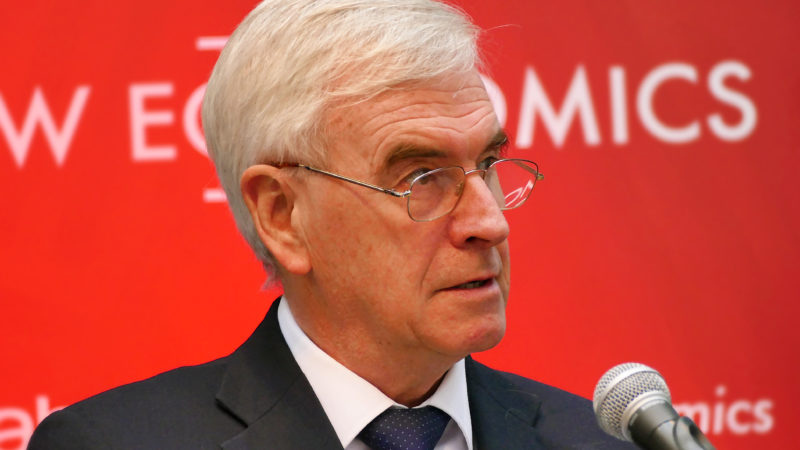Labour are stepping up their climate policies.

Campaigners have welcomed moves by Shadow Chancellor John McDonnell to review how the financial system affects climate change.
In a speech on Tuesday, John McDonnell revealed Labour’s plans for sustainable investment, saying his party views the absolute priority of the next Labour government to be “overcoming this existential threat to our planet.”
He pledged an investment programme that would be transformational, backing major renewable investment delivered through a publicly-owned national grid network and public banks, leading to “well-paid jobs on union rates – 400,000 jobs, in every part of the country.”
But the fresh focus was on the Bank of England’s ‘toolkit’ of powers, with the Shadow Chancellor launching a review to “ensure bank lending flows not into housing and land speculation but productive investment.”
The review will cover commercial banks, investment banks, pension funds, hedge funds, private equity, asset managers, derivatives and securities traders and exchanges, and ‘any other aspect of the finance sector of relevance’.
Clare Hymer, co-founder of Labour for a Green New Deal, said:
“Labour is responding to grassroots pressure with bold and ambitious new climate policies. Labour for a Green New Deal activists are passing motions across the country calling for democratic control of finance and an internationalist just transition, and we’re delighted that today John McDonnell has announced plans for a ‘new banking ecosystem’ and for British green technology to be made available free or cheap to the Global South.
“The free market has utterly failed to tackle the climate crisis, instead taking us to the brink of planetary breakdown. Our response must be to replace the profit motive with the social and environmental motive. A Labour government can and must use every lever available to democratise finance and fund a transformative Green New Deal. Today marks the first steps towards this just and sustainable future.”
Fran Boait, executive director of Positive Money, said:
“With the shadow chancellor’s comments coming the week after the future of finance report called for the Bank of England to rethink its priorities, it appears a new settlement for our financial system is in the making.
“Though the Bank rightly recognises the existential threat climate breakdown poses to financial and economic stability, it has shied away from taking the necessary action, frequently citing the constraints of its mandate and toolkit.
“As regulator of our financial system, the central bank has the ability to shape markets, penalising lending towards destructive carbon bubbles and incentivising productive green investment through policies such as credit guidance. But it is incumbent on the government to empower it to do so.”
Labour have pledged to legislate so that any company listed in London is required to contribute to tackling the climate change crisis – “and if it fails it should be delisted.” The Shadow Chancellor also wants to ensure that the technologies developed in the UK’s ‘Green Industrial Revolution’ are made available free or cheap to the global south.
McDonnell has asked Labour’s new finance sector review group to provide its final report by October 2019. Ann Pettifor said she was ‘chuffed’ to be part of the group.
John McDonnell’s full speech can be viewed here.
Josiah Mortimer is Editor of Left Foot Forward. Follow him on Twitter.
To reach hundreds of thousands of new readers and to make the biggest impact we can in the next general election, we need to grow our donor base substantially.
That's why in 2024, we are seeking to generate 150 additional regular donors to support Left Foot Forward's work.
We still need another 124 people to donate to hit the target. You can help. Donate today.




6 Responses to “Shadow Chancellor calls for ‘new banking eco-system’ to tackle climate change”
PayStub
As the ecosystem evolves, the roles of various players are expected to develop. Although FinTech and BigTech firms may not have made significant contributions to date, bank executives foresee more ecosystem influence in the future. FinTech and BigTech potential and abilities may encourage a shift in banking strategy that spurs partnership and collaboration. Such changing views also give rise to the possibility of shared offerings in which banks and non-banks come together to deliver better and more comprehensive services.